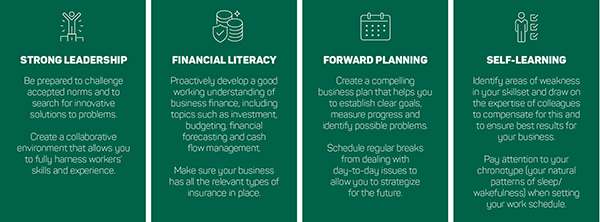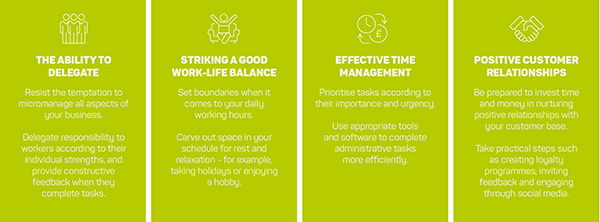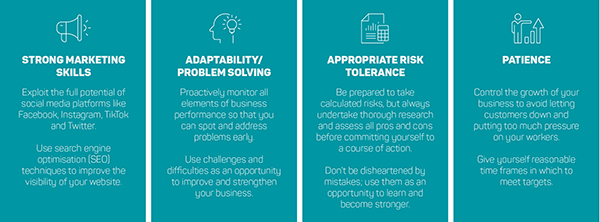
An entrepreneur’s toolkit: Tips from business owners on starting, running and growing a business
Posted on 8th July 2022 by Caunce O'Hara

There are many advantages of being your own boss, from the financial rewards it can bring to the freedom it gives you to pursue your goals and to showcase your knowledge and abilities. However, being a successful entrepreneur isn’t easy. It requires a whole range of skills, not to mention determination.
Here, we break down the key traits you need to start, run and grow a business, and we offer tips from business owners who know exactly what it takes.
Skills you need to start your own business
– Strong leadership
– Financial literacy
– Forward planning
– Self-learning
Skills you need to maintain your business
– The ability to delegate
– Striking a good work-life balance
– Effective time management
– Positive customer relationships
Skills you need to grow your business
– Strong marketing instincts
– Adaptability
– Appropriate risk tolerance
– Patience
Skills you need to start your own business
From having a clear vision and carefully thought out business plan to getting the financials right, there is a lot to consider when setting up a company. Here are some of the attributes you will need to get your fledgling venture off the ground:

Strong leadership
If you want to head up a company, you’ll need to be an effective leader. The most successful businesspeople have a talent for getting employees, investors, customers and others to buy into their visions and to share their excitement for what their companies have to offer.
It’s important to be aware that strong leadership isn’t all about dictating; it’s also about listening to colleagues and nurturing talent. Start-ups are often highly collaborative environments, and leaders who know how to harness the skills and experiences of their workers stand to achieve the best results. Highlighting the importance of this issue, a global study carried out by The Workforce Institute at UKG and Workplace Intelligence found that 74% of employees believe they are more effective in their roles when they feel heard in the workplace.
Many of the most capable entrepreneurs are also thought leaders. Those who challenge accepted norms and find different approaches to problems tend to come up with the most innovative business ideas.
It can be hard to know where to start if you want to become a more effective business leader, but there are practical steps you can take to enhance your skill set. For example, the government-funded Help To Grow Management Course is designed to enable entrepreneurs to hone various important capabilities, including leadership, innovation and employee engagement.
Financial literacy
Financial literacy is one the most fundamental skills that entrepreneurs need. It’s no good having knock-out business ideas if you can’t use them to turn a profit. You don’t need to have the in-depth knowledge of a financial planner to set up your own company, but it is vital that you have a good working understanding of financial management. This includes being able to secure investment, budget effectively, forecast profit and loss, manage cash flow and report the financial performance of your business.
It also means getting to grips with business insurance. From employers’ liability insurance to public liability cover and professional indemnity insurance, there are many different policies that your business may require. Putting the right insurance in place will help to protect your company from certain risks and incidents that could otherwise do major damage to your finances – potentially even jeopardising your ability to continue operating. To discover more about this crucial topic, check out our blog post on insurance for start-ups.
It’s important to note that even if you employ someone within your business who is a professional in finance, you will still need to have a handle on the basics in order to keep your company running smoothly.
Worryingly, research carried out by business software specialists Intuit discovered that 40% of small business owners considered themselves to be financially illiterate, but despite this, 81% had responsibility for their companies’ finances.
If you lack knowledge and confidence in this area, you might find it useful to take a course or even simply read a guide on the topic. There are many different options available. For example, this guide provided by the Federation of Small Businesses includes a section on business finance basics.
Forward planning
There’s a lot to think about when setting up a business, and it’s easy to find that all of your time and energy is consumed by the day-to-day issues and priorities that arise. However, to stand the best possible chance of long-term success, entrepreneurs must be able to plan ahead for what the future holds.
“Forward planning is essential when starting a business. You need to make your processes as robust and scalable as possible because when you get to the point of needing them in their entirety you will be time poor. It’s not possible to predict every eventuality but if you can standardise your back-office processes as much as possible it will stand you in good stead and save you an enormous amount of time and additional effort through periods of significant growth.” – Marc Churchouse, Mercator Group
A hugely important part of preparing for the future is creating a compelling business plan. This will help you to clarify the thinking behind your venture, establish clear goals, measure your progress and spot possible problems. It can also help you to achieve success and get the funding you need to get your ideas off the ground. A survey by Palo Alto Software revealed that entrepreneurs that created business plans were around twice as likely to grow their business and get investment than those without formal business plans. To get you started, you can download free business plan templates online.
Self-learning
Understanding both your strengths and your weaknesses is key to being successful in business. Having the humility and self-awareness to know when you need assistance with a particular task gives you the opportunity to tap into the expertise of others – and in turn this helps to ensure the best results for your company.
“Self-learning is very important but surrounding yourself with good advisors is probably more important. You should take on board as much information as possible but nothing can substitute the advice that you can get from somebody that has already lived the journey. I think it is also important, when taking advice, that you choose the bits that suit the way that you want to live YOUR journey. We are all individuals and the very fact that you are starting your own business is evidence that you think outside of the box – take on the advice but don’t lose who you are in the process.” – Marc Churchouse, Mercator Group
Another aspect of self-learning, and one that you may not have given much thought to previously, is your chronotype. This refers to your natural inclination to sleep and wake, and to feel less or more alert, at particular times of the day and night – what many people refer to as being a ‘night owl’ versus an ‘early bird’. Chronotypes vary from person to person, and may be influenced by factors including your genetics, age, geographical location and more. One of the advantages of being your own boss is that you have considerable control over the hours you work. If you’re aware of your chronotype, you can try to structure your day to take advantage of the times when you are most energetic and productive.
Skills you need to maintain your business
Once you’ve established yourself in business, there are certain skills and priorities that will stand you in good stead, such as:

The ability to delegate
According to the late London Business School professor John Hunt, only 30% of managers think they can delegate effectively, and of those, only one in three is considered to be a good delegator by their subordinates. This means that as few as one in 10 managers is strong when it comes to this leadership skill.
It’s certainly the case that after setting up a company, it can be very hard to let go of any degree of control and to learn to rely on those around you to perform key tasks. However, the ability to delegate is essential. Trying to micromanage all aspects of your business once you are up and running is a recipe for stress and failure. Your time will be much better spent on revenue-generating tasks or big-picture strategising than on basic admin jobs that could be passed over to others – be they employees or third-party agencies.
Effective delegating is also an integral part of being a good leader. It will help those around you to grow and flourish in their roles.
If delegating doesn’t come naturally to you, don’t panic. There is plenty of information and advice available online that can help you to learn this skill. For example, this guide from Harvard Business School sets out nine tips to delegate successfully, including playing to your employees’ strengths and providing workers with constructive feedback once they have completed the tasks you set out.
Striking a good work-life balance
Burnout is unfortunately a hazard of running a business. In fact, according to a study by Investec Private Bank, 64% of entrepreneurs believe that a poor work-life balance is a “necessary sacrifice” to be successful. However, if you’re not careful, you can quickly find that being an entrepreneur soaks up all of your downtime and leaves you feeling exhausted. In turn, this can make you fall out of love with your chosen career path and it may also make you less effective in your role. To avoid these problems, it’s imperative that you set some boundaries to allow yourself time to relax and unwind.
“Your typical 9-5 allows for clearly defined work dedicated hours. If you’re doing something you love, it’s yours – there’s a tendency to have zero boundaries with your personal v work time. Running your own business means being fully responsible for the day to day as well as the back end. It’s all consuming but brilliant and a huge personal achievement for us both.” – Tom and Sian, Chatsworth Bakehouse
Whether it’s chilling out at home with your family, getting stuck into a hobby, taking a well-earned holiday or anything else, carve out space in your schedule to enjoy some ‘you time’. If possible, set boundaries when it comes to daily working hours too. Of course, there will be occasions when you need to deal with issues urgently regardless of the time, but try not to get into the habit of checking emails and doing other work tasks around the clock.
The visual below displays a breakdown of 55 people’s working day across 11 industries. As you can see, work-life balance means different things to different people and many people who go freelance see an improvement in their personal happiness levels.
To drill down further into the work-life balance of entrepreneurs, we polled 200 self-employed people in the UK. Here’s what we discovered…
- It seems most entrepreneurs are satisfied with their work-life balance. When asked to rate their work-life balance out of 10 (with 1 being very unhappy and 10 being very happy), 86% of respondents answered between 5 and 10, with 14% answering 10.
- The majority of entrepreneurs are managing to keep their weekends free, with only 30% working Saturdays and 20% working Sundays. In contrast, Monday was the most popular day for working, with 89% of respondents saying they put hours in at the start of the week.
- A large majority of those polled (89%) suggested they were happier freelancing than being employed. Those in the 45-54 age group were the happiest of all with this career choice, with 97% saying they preferred this style of working.
Effective time management
Related to the previous point, it’s essential that you get into good time management habits when you are your own boss. No matter what industry you’re in, running a business inevitably comes with a significant to-do list and there’s a risk you’ll end up feeling overwhelmed by the sheer scale of the work.
You risk wasting a lot of time on inefficient and unproductive tasks too. A study carried out by software and cloud technology specialist SoftwareONE discovered that UK office workers spend an average of two hours each day browsing their email inboxes, and around half of this time is squandered accidentally re-reading messages. This could result in up to 230 hours of lost productivity per worker each year.
However, by implementing effective time management techniques, you should be able to avoid inefficiencies like these and keep on top of your workload. This can involve delegating, as touched on previously, as well as using appropriate tools and software to make admin tasks more efficient. It’s also vital to know what to prioritise.
“We use two-time management tools, ClickUp to manage our projects and activities, including project specific communications, then Clockify to track time being spent, to make sure clients are billed correctly.” – Philip Bacon, Bacon Marketing
If you think your business could benefit from time-saving software but you’re not sure what would be the right fit for your organisation, you can get some ideas and information here.
Positive customer relationships
With figures from conversion rate optimisation specialists Invesp suggesting it costs five times more to attract a new customer than it does to keep an existing one, it’s clear to see the value of nurturing positive relationships with your customer base. It simply makes financial sense to ensure that your customers are happy with the products or services you provide.
“During meetings with one of our clients we started to observe the main pain points for them delivering their services to the end client. To smooth the delivery of their projects we created an additional service which supported, but sat outside, our normal offering. This service became the basis of an even stronger relationship with the client and has subsequently been rolled out to other clients. Ultimately, from simply understanding our client’s whole delivery and observing some day-to-day issues, we created a significant revenue stream and as a direct result of this we have been able to establish a business in the US – of course we gained financially but the initial goal was just to solve a problem for a client!” – Marc Churchouse, Mercator Group
There are many simple but effective ways to promote good customer relationships. For example, you can:
- Invite feedback from customers. This will give you a clear idea of what you’re getting right and wrong.
- Use technology to have conversations with customers. Social media gives you the perfect opportunity to not only tell people about your business but also to listen to their thoughts, experiences and priorities.
- Exceed expectations. By under promising and over delivering, you will avoid disappointment and leave customers feeling positive about your business.
- Reward customers. Creating loyalty programmes and other reward schemes for long-term customers will show these people that their business matters to you and give them an incentive to stick with you.
Skills you need to grow your business
Once you’ve established your business and made sure it’s running smoothly, you might start to think about expansion. The following capabilities will help you to achieve your goals when it comes to growth:

Strong marketing skills
Marketing savvy is essential at all points of your business journey, and of course you won’t be able to grow your company without it.
Increasingly, entrepreneurs are relying on digital advertising as a means of generating leads. Reflecting this, a report produced by social media experts Socialbakers suggested that marketers increased their spending on Facebook and Instagram by 60% in Q1 2021 compared to 2020. As well as harnessing the power of social media platforms like Facebook, Instagram, TikTok and Twitter, marketers are using search engine optimisation (SEO) techniques to improve the visibility of their websites.
If you don’t feel confident in this arena, you might want to sign up to a digital marketing course (such as these programmes offered by the Chartered Institute of Marketing) to improve your knowledge, or you may decide to hire an expert to look after this aspect of your business. Another option is to outsource tasks like social media management and SEO to a third-party. However you do it, it’s vital that you ensure your business gets the positive exposure it needs.
Adaptability/ problem solving
As an entrepreneur, you will encounter problems. This is simply part of the job. The key is to be able to deal with issues as and when they arise, and the best business people often have the ability to turn adversity to their advantage – using times of challenge to develop and strengthen their companies and to come out bigger and better on the other side.
“You need to be observant – your business will have many moving parts and you need to be able to identify patterns or things that just don’t feel quite right. Equally you need to be able to spot opportunity when it isn’t always obvious. There will be many occasions where you will need to adapt, and spotting things in advance will help a lot.” – Marc Churchouse, Mercator Group
This guide from the Chartered Management Institute offers useful problem solving techniques. It sets out an action checklist that may help you get to grips with this potentially tricky element of entrepreneurship.
Appropriate risk tolerance
No one gets to the top of their game in business without taking risks. Skilled entrepreneurs know when to take the plunge and embrace a level of uncertainty, and when not to. Sometimes things don’t go to plan. In these cases, entrepreneurs simply have to pick themselves up, learn from their mistakes and do better next time.
“Never be afraid of something not working out. If you do, you will just tie yourself up in that. You have got to pick a path, and a route to take, and just start. If you get halfway through and don’t get the results you are after, you step back, take a look at why it didn’t work, and then start again by taking a different path. At the end of that project, ask yourself if you got the outcomes you wanted. If not, what lessons can you learn when you try again? That isn’t failure. That is moving forwards and making progress.” – Richard Osborne, UK Business Forums
When it comes to assessing whether or not to take a particular risk, it’s important to be clear-headed in your approach. The best entrepreneurs are calculated risk takers.
Certain types of risk are less dangerous to your business than others because you can prepare extensively for them – for example, by doing detailed market research, assessing the pros and cons and calculating potential losses. Being able to identify risks that are worth taking, and putting in the background work so that you’re in a position to make an informed decision, could be the difference between failure and success.
Patience
To expand a business successfully, patience can be a hugely important trait. As we mentioned above, growing a business means taking risks where appropriate, but it also means knowing when to bide your time – and not trying to do too much too soon. If you rush growth, you might fail to establish the solid foundations you need to help you to flourish in the long term. You could end up letting customers down and putting too much pressure on your employees.
Entrepreneurs who exercise patience when appropriate stand to build much more solid businesses with a better chance of lasting success. If you’re someone who naturally wants to get things done in a hurry, the following pointers could help you to become more patient:
- Give yourself reasonable time frames in which to achieve your goals.
- Make time on a regular basis to reflect on and enjoy your successes to date.
- Avoid continually comparing yourself to others. Focus on your own path.
Have your own entrepreneurial insights you’d like to share? Join the conversation on social using #TheEntrepreneursToolkit
Sources:
https://startupnation.com/start-your-business/essential-skills-start-run-business/
https://www.theknowledgeacademy.com/blog/the-8-skills-you-need-to-run-your-own-business/
www.invespcro.com/blog/customer-acquisition-retention/
https://www.podium.com/article/marketing-skills/
https://www.sleepfoundation.org/how-sleep-works/chronotypes
https://online.hbs.edu/blog/post/how-to-delegate-effectively
https://www.independent.co.uk/news/office-workers-uk-email-time-a9149121.html
https://www.socialbakers.com/blog/social-media-trends-report-q1-2021
https://www.forbes.com/sites/jodiecook/2019/08/01/work-life-balance/?sh=4dbbca4e64af
https://timberry.bplans.com/real-data-on-the-success-of-business-planning/
Useful Links

Professional Indemnity Insurance
Protects against claims of alleged negligence in your professional services, advice and designs.

Public Liability Insurance
Protects against claims of injury to third-parties or damage to a third-party's property.

Employers' Liability Insurance
A legal requirement for anyone employing staff. Protects your business in-case an employee is injured at work.

Cyber Insurance
Covers your business in the event of a malicious attack on your computer systems and data.

Directors and Officers Insurance
Protects your assets in the event of a claim. You may be held personally responsible for your business action and will have unlimited personal liability.

